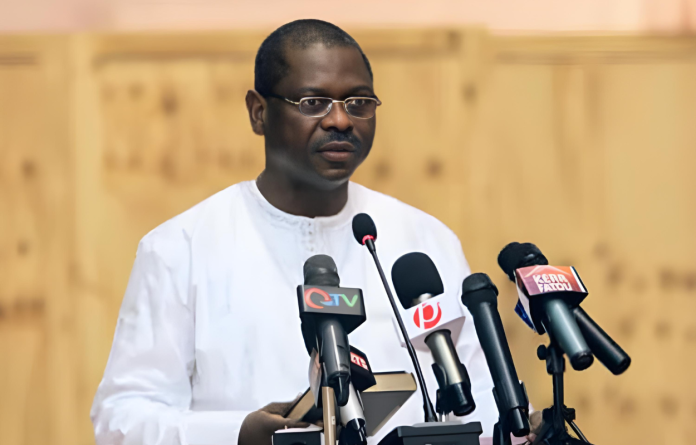By Nelson Manneh
Finance Minister Seedy Keita on Friday defended the government’s handling of a $30 million oil scandal, insisting that allegations of bribery, money laundering and tax evasion could not be substantiated despite a parliamentary report confirming widespread fraud and governance failures.
Speaking at a press conference on August 29, Mr. Keita said: “The allegation of bribery, money laundering and tax evasion on the petroleum products worth $30 million could not be established. This was the conclusion of the inquiry; the key four primary bases of the inquiry were not found. The government acknowledges the conditional comment that the parliament produced.”
The controversy centers on the importation and sale of Russian oil in 2024. In July 2025, the National Assembly adopted a Joint Committee report that detailed systemic corruption in the petroleum sector, implicating unlicensed companies, illicit offshore bank accounts controlled by a foreign national, and regulatory lapses at PURA, the GRA and the Central Bank.
The report accused state institutions of failing to monitor petroleum imports and raised concerns over political interference with police investigations. Civil society groups, particularly Gambians Against Looted Assets (GALA), petitioned President Adama Barrow’s government, demanding executive action.
Following weeks of mounting public pressure, the government formed a high-level panel to review GALA’s concerns, which included three key issues: the $30 million petroleum scandal, unresolved audit cases, and the findings of the Acute Kidney Injury (AKI) panel.
Mr. Keita dismissed suggestions of a confrontation with activists. “The quest of GALA is not the government versus GALA but a collective responsibility,” he said. “Their petition was meant to foster accountability and the government has looked into it and responded judiciously.”
The Finance Minister outlined steps the administration has taken since 2017 to combat corruption and strengthen governance, citing the Anti-Corruption Act, the Access to Information Act, and efforts to digitalize the Gambia Revenue Authority. He noted that the country’s Transparency International ranking had improved from 130th globally in 2017 to 96th in 2024.
“Our corruption index as per the Transparency International score has improved from a score of 30 out of 100 in 2017 … to a score of 38 out of 100 in 2024,” he said. “This significant improvement is supported by new legislations such as the Anti-Corruption Act and the Access to Information Act.”
He also highlighted reforms in the financial sector, the creation of a State-Owned Enterprises Act to enhance oversight, and amendments to the Central Bank Act. The government, he said, has boosted civil service salaries by more than 110 percent since 2017.
Still, the scandal has exposed serious credibility challenges for the administration. The Joint Committee’s report underscored “serious governance failures, non-compliance, and lax institutional oversight,” and critics argue that the government’s response has been slow and overly defensive.
Mr. Keita said the GRA had already issued “a best of judgment assessment to the two non-compliant companies in the sum of D8,576,716 and D12,296,923 respectively and instituted a recovery process to ensure that they comply with the tax obligation.”
Looking ahead, the Finance Minister announced plans to establish a petroleum testing laboratory under the Gambia Standards Bureau to address “quality assurance, environmental safety and consumer protection” in the sector.
“The will of justice may be slow,” he said, “but it shall surely come to pass.”


















